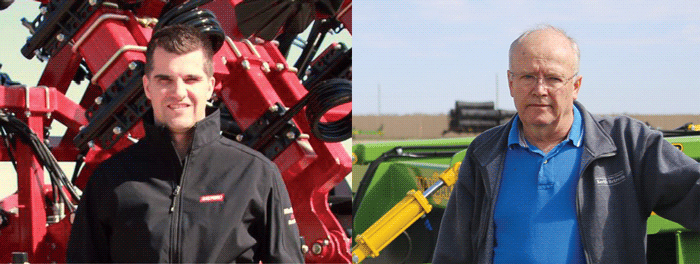Brad Baker
Senior Product Manager,
Salford Group, Salford, Ont.
John Redekop
Owner and Founder,
Mandako Intl., Plum Coulee, Man.
Pictured Above: John Redekop (right) details the difficult, yet necessary transition from machine design and development to macro-level management for Mandako, hiring employees at an expedited rate over the past decade. Brad Baker (left) says putting faith in employees to invent and enact new ideas is both the positive driver and inherited risk of Salford’s growth.
Brad Baker: I was curious what you attribute your success to and how you got past that stage of being a small job shop builder to an actual manufacturer?
John Redekop: Well first, you have to have the interest and motivations. I attribute a lot of that to the Lord, because he gives us the insights and he lets us work. That’s my primary stake, but you know it’s amazing what comes out of a small farm boy to be able to generate equipment that goes not only in Canada, but across the water and a big market in the U.S. as well.
You have to listen to what people want to see out of your equipment. You don’t count so much as the customer does. The customer is always right first, until you know that he’s not. But first, he is right.
“A lot of these small manufacturers that end up being successful have founders with the ability to let go and implement people…”
– Brad Baker
I’ve had good help, especially in the last 10 years. My family has also been introduced and they are running the company today. They’ve got some newer ideas than what I had. I get to see and ask the questions out there and implement those answers, more so than when I was hands-on.
When you’re hands on, it means you’re tying up your brain: doing business, doing designing, doing machining. Somebody else has to take that on. So, we’re to that point where I can just oversee and give directions if necessary. But that’s making a long step. There’s a lot of stuff in between there.
Baker: Did you find it difficult going from being the hands-on guy right there creating, to being the guy that’s stepped back and asking others to do work that you’ve only been involved in?
Redekop: It takes a lot of letting go. Thirty years ago, I didn’t have an employee. I was adding an employee per year until about 20 years ago and then of course, it mushroomed a little bit more in the last 10.
There’s intelligence in people that you have to find, and they have to show it. If they can’t, then of course they’re not the right fit.
Baker: Salford has a very broad management team now. We have our CEO Geof Gray, but the activities of the corporation now are steered by multiple individuals. And Jake Rozendaal, our founder, he reached the point in the growth of his business where he had that realization that, “Look, if we’re to succeed in allowing this to flourish, I need to put my trust in the people I hire and trust them to make good decisions. If I can’t let go, then this isn’t going anywhere.” I think he was in his 60s when he started to come to that realization and put things in the hands of people that can help make this work. I think to some degree, a lot of these small manufacturers that end up being successful have founders with the ability to let go and implement people. And that’s the difficulty with any company. You invite a little bit of risk. You can’t move forward and innovate if you don’t take risks.
“When you’re hands on, it means you’re tying up your brain: doing business, doing designing, doing machining. Somebody else has to take that on…”
– John Redekop
So keeping and maintaining that mentality and not going stagnant is really the big challenge. And yet as you get larger and transition from a multi-million dollar company to a multi-billion dollar company, it gets worse and worse and…
Redekop: You can’t keep track of it.
Baker: Exactly, and that’s always a big risk moving forward: going stagnant and losing your way.
Redekop: A great quality to have in an employee is being able to dig in while also letting others do their share, because many hands are better than one hand and many heads are better than one head.
It is a big thing to share the knowledge, and for us, it’s family. We have four sons-in-law that are active and two of our daughters that are holding the top positions. So it’s still family in that way.






